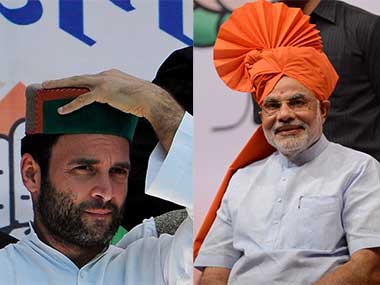A few bankers, economists, and rating agencies this writer spoke with over the last few days seemed to bet for a second term for Narendra Modi rather than a coalition of Congress-led parties. Their view: India’s scattered Opposition parties can keep blaming the Narendra Modi government for partial release or “misrepresentation of official data” or failure to address rural stress, but the fact is that Prime Minister Narendra Modi still has an advantage over the Opposition, which clearly lacks a solid plan to get the country’s economy back on track. Most of the people who shared their views on the preference and hope for the next government spoke to Firstpost on the condition of anonymity.
In July, last year, ace stock market investor Rakesh Jhunjunwala too said he expects Prime Minister Narendra Modi to return to power in 2019. His reasoning; “What agenda the Opposition has? Remove Modi?” Jhunjhunwala’s question resonated well with a lot of investors looking at investing in India’s largely untapped consumer market.
The Indian economy’s biggest disadvantage is its weak political opposition that can’t offer a better roadmap for the economy than what the Modi-government has done so far. Even the Congress party, which ruled the country during most years since Independence, visibly lack the political will to carry forward the reform agenda and provide a radical shift to lift the economy back on a high-growth path. That’s the reason industrialists and investors support Modi’s BJP and look at the Rahul Gandhi-led alternative with skepticism. [caption id=“attachment_2705186” align=“alignleft” width=“380”]  File image of Rahul Gandhi and Narendra Modi. AFP[/caption] At the end of his 5-year rule, the Opposition has questioned Modi for the way his government has handled data credibility, demonetisation, and rising unemployment. However, not even his political enemies can deny that it was during Modi’s rule India got two of its very critical economic reforms passed—Insolvency and Bankruptcy Code (IBC) and Goods and Services Tax (GST). These were pending proposals for at least a decade. Modi also sped up the expansion of the banking sector to rural households and with the help of the Jan Dhan Aadhaar Mobile (JAM) trinity rationalised the subsidy system. The political will to generate consensus and move important legislation was revived after a long period of so-called policy paralysis. Although Modi came in for criticism from the Opposition and economists for demonetisation, he has managed to retain the image of a political leader who is proactive in his approach to reforms. The IBC brought down the time period to resolve cases considerably and GST, though badly implemented, elevated India to the list of countries with a unified tax system. The economy’s fiscal fundamentals were improved with inflation under control and deficit much lower than the UPA era. Also, the big battle on non-performing assets (NPA) clean-up too was launched during the Modi regime—an exercise which is continuing even now. Right now the Indian economy is going through a tough phase with demand slowing across sectors and a weak global economy adding to the pain. Agri distress and unemployment are unresolved issues. These necessitate the next government start work on Day 1 and manage the economic mess which isn’t an easy task.
What does the Opposition have to offer? The Congress party, in its political manifesto, has promised NYAY—a scheme that assures minimum income of Rs 72,000 to the poorest 20 percent of India’s population. Over the last few years, Rahul Gandhi has been a major advocate of disastrous farm loan waivers across states. The Congress has primarily highlighted free cash transfers to the poor as its answer to curtailing poverty, but its plans for economic revival largely end there.
Schemes such as NYAY will have damaging effects on the economy. Farm loan waivers already punched a big hole in the finances of the government and banks, thus weakening the economy. The Minimum income guarantee schemes will be the next. A back of the envelope calculation shows that the total burden of Gandhi’s minimum income promise will be Rs 3.6 lakh crore. That’s 1.7 percent of the country’s Gross Domestic Product (GDP). We are talking about an economy that has breached the fiscal deficit target for three consecutive years and is struggling to mop up revenues to keep its balance sheet healthy. With the Opposition lacking a credible plan to boost the economy, the investors seem to prefer Modi as a better bet.


)

)
)
)
)
)
)
)
)



